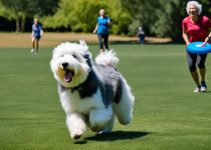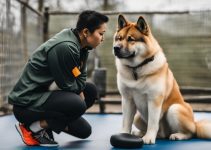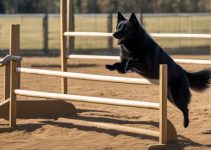Bichpoos, also known as Bichon Poodle mixes, are cherished for their charming appearance, friendly disposition, and intelligence. They require proper training to ensure they become well-behaved and obedient companions. In this section, we will explore effective techniques for Bichpoo training, including positive reinforcement, crate training, leash training, and behavioral training. These tips and methods will help you establish a strong bond with your Bichpoo and ensure a harmonious relationship based on mutual trust and respect.
Unraveling Bichpoo Training
- Positive reinforcement is highly effective for Bichpoos and involves rewarding desired behaviors with treats, praise, or playtime.
- Crate training is crucial for setting boundaries and providing a safe space for your Bichpoo.
- Leash training is important to ensure your Bichpoo walks calmly and obediently on a leash.
- Addressing behavioral issues such as separation anxiety and excessive barking requires proper training techniques.
- Consistency, patience, and love are essential for successful Bichpoo training.
Bichpoo Training Techniques: Using Positive Reinforcement
Positive reinforcement training is a highly effective method for training Bichpoos. These adorable Bichon Poodle mixes respond well to rewards and praise, making positive reinforcement a natural fit for their training needs. By incorporating this technique into your Bichpoo’s training routine, you can establish a strong bond and encourage desired behaviors.
The Power of Rewards and Praise
In positive reinforcement training, desired behaviors are rewarded with treats, praise, or playtime. This approach focuses on reinforcing positive behaviors rather than punishing negative ones. By utilizing rewards and praise, you create a positive association with the behaviors you want your Bichpoo to exhibit.
Consistency is crucial when using positive reinforcement training. Consistently rewarding your Bichpoo for desired actions helps them understand what is expected of them and reinforces those behaviors. Be sure to provide rewards immediately after they exhibit the desired behavior to strengthen the connection between the action and the reward.
Effective Positive Reinforcement Techniques
In addition to treats and praise, there are various techniques you can use to reinforce positive behaviors during Bichpoo training:
- Clicker Training: Clicker training is a popular method that uses a clicker to mark precise moments when your Bichpoo performs a desired behavior. A click sound is followed by a reward, creating a clear signal for your dog to understand. This precise marking helps your Bichpoo associate the behavior with the reward.
- Treat Training: Treat training is a simple yet effective way to reinforce positive behaviors. Use small, bite-sized treats as rewards and give them immediately after your Bichpoo exhibits the desired behavior. This form of training helps motivate and encourage your furry friend.
- Praise Training: Along with treats, giving verbal praise such as “Good job!” or “Well done!” can also be effective. Bichpoos are social and eager to please, so your enthusiastic and positive tone will further reinforce their good behavior.
By consistently using positive reinforcement techniques, you can successfully train your Bichpoo and reinforce positive behaviors. Remember to be patient, consistent, and always provide rewards immediately after the desired behavior. With time and practice, your Bichpoo will become a well-behaved companion who responds eagerly to your positive reinforcement training.
Crate Training and Leash Training for Bichpoos
Crate training is an essential aspect of Bichpoo training. It helps establish boundaries and provides a safe space for your Bichpoo. By introducing a crate gradually and using positive reinforcement techniques, you can ensure that crate training is a positive experience for your furry friend. The crate becomes their den, where they can retreat and feel secure.
When introducing the crate to your Bichpoo, start by placing their favorite toys, bedding, and treats inside. Make it a comfortable and inviting space for them. Use positive reinforcement by offering rewards and praise when they enter the crate willingly. Never use the crate as a punishment or for extended periods without breaks.
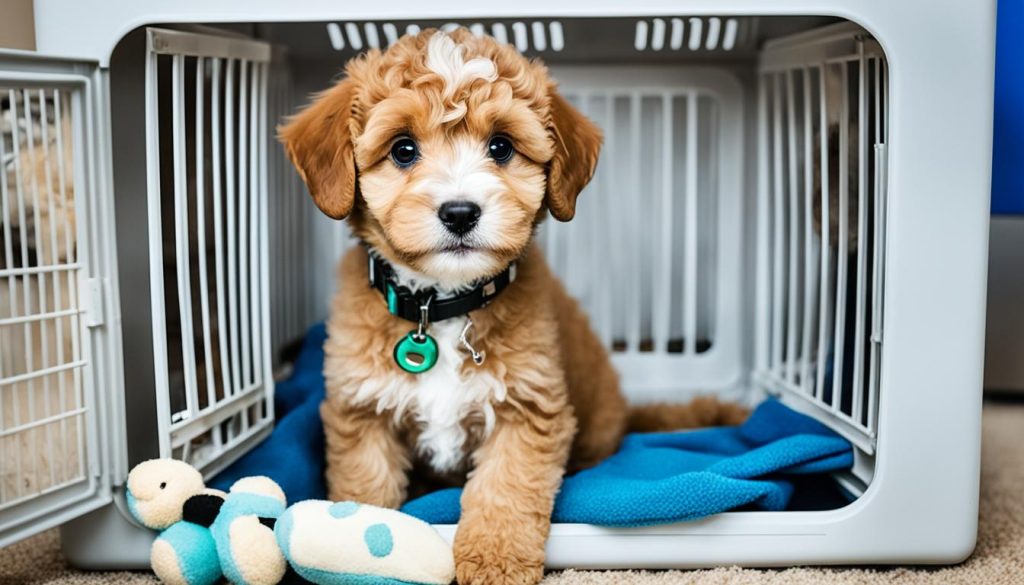
Leash training is equally important to ensure that your Bichpoo walks calmly and obediently on a leash. Begin by using a lightweight leash and a properly fitted harness or collar. Start in a quiet and familiar environment free from distractions.
- Allow your Bichpoo to become comfortable wearing the harness or collar by gradually increasing the duration.
- Start by walking a few steps indoors and reward them for walking by your side.
- Gradually increase the length of walks and introduce them to different environments, such as parks.
- Use positive reinforcement techniques like treats and praise to reward good behavior.
- Practice loose leash walking by stopping whenever they pull and only proceeding when the leash is loose.
Consistency is key in both crate training and leash training. Set a routine and stick to it. By using positive reinforcement, patience, and consistency, you can effectively train your Bichpoo to be well-behaved both in the crate and on the leash.
Behavioral Training for Bichpoos: Addressing Common Issues
Just like any other dog breed, Bichpoos may experience behavioral issues that require proper training and attention. Addressing these issues is crucial to ensure that your Bichpoo becomes a well-behaved and harmonious companion.
One common behavioral problem in Bichpoos is separation anxiety. These dogs can become distressed and exhibit destructive behavior when left alone. To address separation anxiety, it’s important to gradually acclimate your Bichpoo to your absence and create a positive association with it. Desensitization techniques, such as leaving for short periods and gradually increasing the duration, can help your Bichpoo feel more comfortable when you’re away.
Excessive barking is another issue that many Bichpoos face. To curb this behavior, it’s essential to understand the underlying cause. Bichpoos may bark due to boredom, anxiety, or a need for attention. Identifying the trigger and redirecting their attention through positive reinforcement can help reduce excessive barking. Consistency is key in addressing this issue.
Socialization is crucial for Bichpoos to ensure they interact well with other dogs and people. Early and positive socialization experiences can help prevent fear-based aggression and make Bichpoos more confident and friendly. Introducing your Bichpoo to various environments, people, and animals in a controlled and positive manner will foster good social skills.
When addressing aggression in Bichpoos, it’s important to consult a professional dog trainer or behaviorist for guidance. Aggression can have underlying causes, such as fear or territoriality. Employing counterconditioning techniques, where your Bichpoo forms positive associations with previously negative triggers, can be effective in managing and reducing aggressive behaviors.
Remember, behavioral training is an ongoing process that requires patience, consistency, and positive reinforcement. By addressing common issues such as separation anxiety, excessive barking, socialization, and aggression, you can help your Bichpoo become a well-adjusted and well-behaved companion.
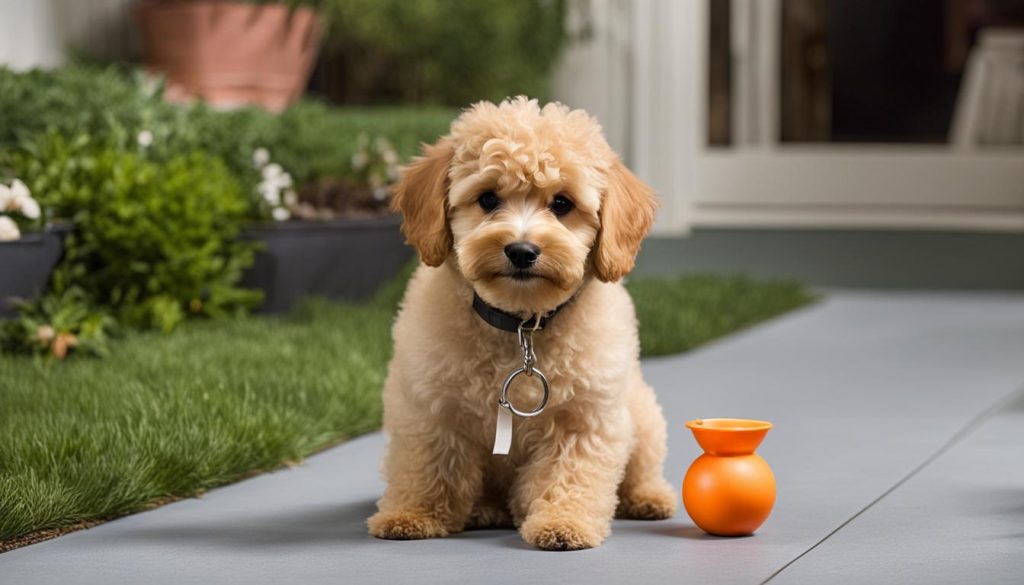
Conclusion: Successful Bichpoo Training for a Happy and Well-Behaved Companion
Training your Bichpoo is an essential part of being a responsible dog owner. By using positive reinforcement, crate training, leash training, and addressing behavioral issues, you can ensure that your Bichpoo becomes a well-behaved and happy companion.
Throughout this training guide, we’ve provided valuable tips and techniques to help you establish a strong bond with your Bichpoo. Remember that training takes time, patience, and consistency. By following these methods, you can create a harmonious relationship based on love, kindness, and positive reinforcement.
With successful Bichpoo training, you’ll have a well-behaved companion who brings joy to your life. Training your Bichpoo not only benefits their behavior but also enhances their overall well-being. A well-trained Bichpoo is a happy Bichpoo.
This Bichpoo training guide equips you with the necessary tools to train your furry friend effectively. By incorporating the training tips and techniques discussed in this guide, you can ensure a happy and well-behaved Bichpoo. Embrace the journey of training your Bichpoo with love and patience, and you will reap the rewards of a wonderful companion for years to come.
FAQ
What is the best training technique for Bichpoos?
Positive reinforcement training, which involves rewarding desired behaviors with treats, praise, or playtime, is highly effective for Bichpoos. Consistency is key in this technique to help the Bichpoo understand what is expected of them. Clicker training, treat training, and praise training are popular methods that focus on rewarding the Bichpoo for good behavior.
How can I crate train my Bichpoo?
Crate training is an essential part of Bichpoo training. It helps establish boundaries and provides a safe space for the dog. Introduce the crate gradually and use positive reinforcement to make it a positive experience for the Bichpoo. By creating a positive association with the crate and gradually increasing the time spent inside, your Bichpoo will learn to view it as a comfortable and secure place.
What are the key techniques for leash training a Bichpoo?
Leash training is crucial to ensure your Bichpoo walks calmly and obediently on a leash. Use positive reinforcement, such as treats and praise, to reward the Bichpoo for walking nicely on a loose leash. Consistent training, patience, and practice are important for leash training success. Start by introducing the leash in a positive and gradual manner, and gradually increase the length and duration of walks as your Bichpoo becomes more comfortable and responsive.
How can I address behavioral issues in my Bichpoo?
Behavioral issues in Bichpoos, such as separation anxiety, excessive barking, and aggression, can be addressed through behavioral training. Techniques like desensitization, counterconditioning, and positive reinforcement can help alleviate these issues and promote good behavior. Socialization is also crucial to ensure that Bichpoos interact well with other dogs and people.



